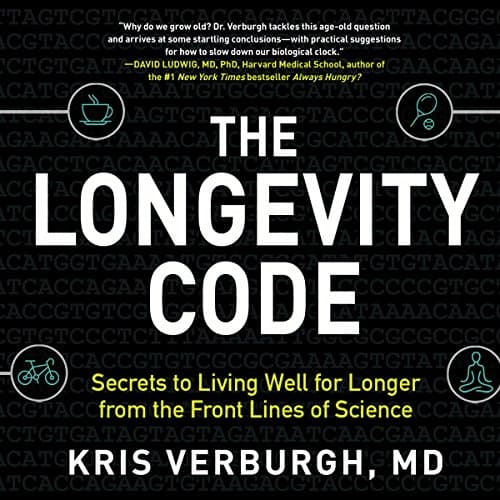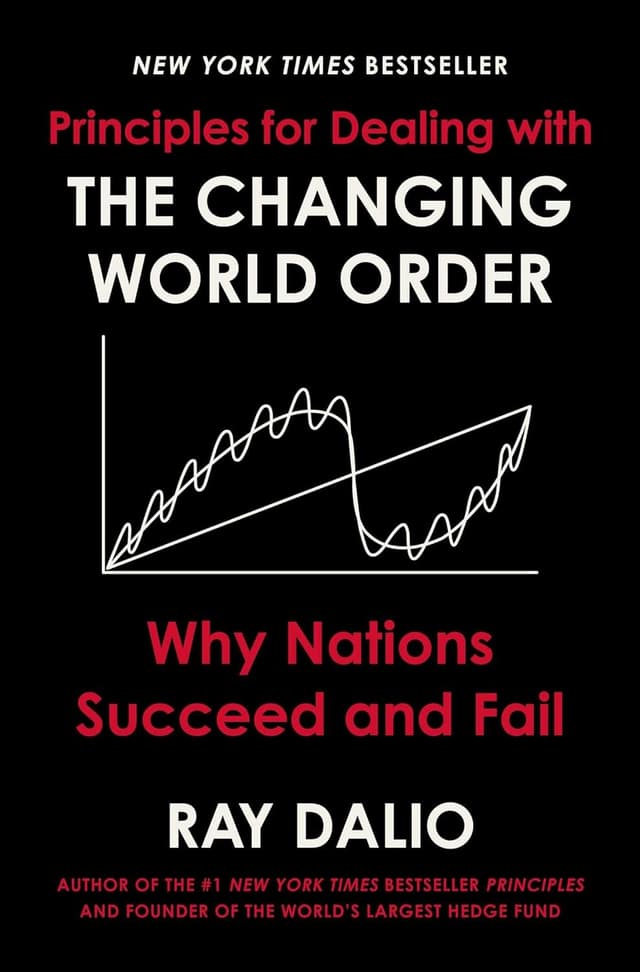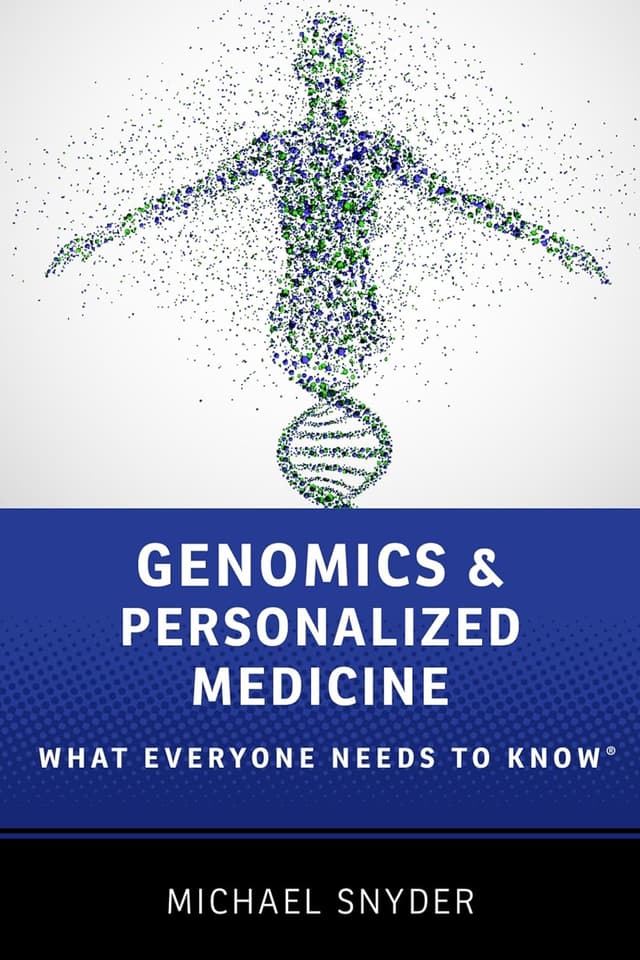Maud Pasturaud | January 10, 2022
The Monday Media Diet with Maud Pasturaud
On aging, trains, and the city of light
Recommended Products

This book goes deep into the science of longevity, explaining the mechanisms that cause aging and how to slow them down for a healthier life.

Dalio explores the rise and fall of major empires to understand the forces behind the shifting global order and offers principles for navigating future changes.

Michael Snyder, a leader in genomics and personalized medicine, provides a practical grounding in these fields which are set to revolutionize healthcare.
Maud Pasturaud (MP) is a longstanding friend of WITI. We first met on a panel at Northside Festival a few years back, and she’s since decamped back to the city of light. Here, she goes deep on longevity, trains, and The Jardin du Palais Royal. Have a great week. -Colin (CJN)
Tell us about yourself.
Hi! I’m Maud from Paris.
At 18yo, I dropped my dream to become a professional ballerina, to pursue another equally rigorous career path, tech. So after a few uneventful years in business school, I decided to move to the mecca of it all, Silicon Valley, to do more of this thing that fascinated me.
That was the start of a 13y+ career in tech start-ups: I specialized in Growth marketing and was lucky enough to lead Growth at companies like Gilt Groupe, Secret, Mercari, and most recently Bumble in EMEA.
After many milestones, lessons, and moves between NYC and SF –– I yearned to be back home in Paris, the city I love, and where I felt there was a tremendous opportunity in the tech space.
Nowadays, I advise and invest in early-stage consumer companies across the EU and US - with a focus on healthcare, web 3, and mobile.
As for non-work stuff? Pilates, yoga, and dance (salsa!) keep me sane. Museums, opera, and ballet keep me cultured. I travel to the US (for work) and Mexico (for fun) on the regular. I nerd out on longevity and functional medicine a lot. I also started a small upcycling label called Remode Paris where we upcycle designer clothes with Haute Couture embroidery.
Describe your media diet.
The world’s order is changing fast. In tech, where I work, being curious is not just a skill, it’s a necessity. I am continuously shifting my media sources, topics, and habits to keep up, and I am also dedicating more and more time to it - probably around 1 to 2 hours a day.
My diet: Newsletters in the morning, podcasts any time I am moving, books, and long-form content on weekends. I read about tech - a lot - but also about fashion, society and finance.
General tech/finance/culture newsletters that keep me informed on the daily: Morning Brew and Hustle are my go-to’s. Their editorial is quirky, unbiased, the right amount of short/long-form - I actually look forward to reading them every day. Then I’ll browse through the Bankless (Web 3), Highsnobiety and BoF (culture/fashion), or Robinhood Snacks (finance) newsletters to see if there’s anything worth diving into.
Podcasts...just about everything, every day. Top right now: Peter Attia for all things longevity and functional health, Kevin Rose’s Modern Finance for some (often humbling) Web 3.0 masterclasses, Sam Harris’ Making Sense for modern philosophy.
On weekends, it’s The Economist, books, and articles that give me stuff to think about. Ana Andjelic’s Sociology of Business offers incredible frameworks for brand and marketing, First Round Review and NFX ‘s Founder library for tech.
What’s the last great book you read?
The Longevity Code by Dr Kris Verburgh
There’s been more research in the last 2 years about longevity than in the last 10: there’s now a scientific consensus about what mechanisms in our body (cellular senescence, telomere shortening, etc) cause aging. And we now also know that these are the same mechanisms that cause cancer, Alzheimer’s, etc. Aging is therefore the “ultimate'' disease we need to focus on. This is a paradigm shift in how we approach healthcare.
There’s been much heat around it lately, with billionaires like Bezos to Thiel the immortality race and investing in companies that may create the “miracle pill” that will make us live forever.
But there is a much more reasonable, nuanced, story to longevity:
1. Fighting aging should not be about reaching immortality or adding 10 more years to our life. Rather should be about keeping our aging mechanisms youthful for as long as possible, therefore unabling healthier aging - without major disease, with maximum energy. Imagine life without the threat of cancer, heavy cognitive decline or crippling osteoporosis?
2. We don’t need a magical pill for that: Based on the latest research, there is a lot you can do *now* to unlock a healthy lifespan across your sleep, diet and exercise.
I have read a few books from scientists to better understand aging and the underlying science. And Dr Verburgh’s (who advises billionaires on how to optimize their routines for longevity) is best at summarizing - in simple terms - current scientific knowledge on the topic and offering very practical suggestions for how to slow down aging. I recommend it to everyone.
What are you reading now?
I’m reading two books
“The changing world order” by Ray Dalio - Dalio brings readers along for his study of the major empires, including the Dutch, the British, and the American, putting into perspective the “Big Cycle” that has driven the successes and failures of all the world’s major countries throughout history. He reveals the timeless and universal forces behind these shifts and uses them to look into the future, offering practical principles for positioning oneself for what’s ahead.
“Genomics and personalized medicine, what everyone needs to know” by Michael Snyder. Genomics is the essential part of the longevity and personalized medicine movements that are about to revolutionize healthcare. Michael Snyder - chair of Genomics and Personalized Medicine at Stanford University and founder of the healthcare startup Q Bio - is one of the world’s leaders in this field and offers a practical grounding in this book.
What’s your reading strategy when you pick up a copy of your favorite publication?
If it’s a book or a magazine, I’ll just grab it when I have an hour ahead of me, pick up a warm tea from Mariage Frères, turn the Opal app on ion my phone - to block distracting apps -, and enjoy some “deep”, undistracted reading time.
Who should everyone be reading that they’re not?
The Longevity Code - for the reasons stated above.
Very simply, Longevity medicine is about to bring a paradigm change to healthcare. This is one of the best books (you can grab David A Sinclair’s “Lifespan: Why We Age―and Why We Don't Have To“ as a complementary read) to both grasp the scale of this revolution, and start taking ownership of your own health, healthspan and lifespan.
What is the best non-famous app on your phone?
Opal to keep my phone and social media consumption in check :) It disables a bunch of useless apps that distract you from being present and doing deep work.
Zero to track my fasts (fasting is one of the most powerful things you can do for your longevity!).
Plane or train?
Train. Because the planet. And because we’re lucky in Europe and in France in particular that the high-speed train infrastructure is amazing. (Paris-Marseille in 4h is a regular, so is the Paris-London in 2.5h).
What is one place everyone should visit?
One place you should visit - The Jardin du Palais Royal in Paris. A hidden gem. A masterpiece of Parisian architecture that feels secretive, intimate. My favorite place in Paris.
One place you should stay - Mexico City. Rich, colorful, fascinating. A lunch at Contramar, a pastry at Panaderia Rosetta, a lesson of architecture at Luis Baragan’s Maison-Atelier, hours watching life unfold at the Plaza Rio de Janeiro. Mexico City feels like a second home to me.
Tell us a story of a rabbit hole you fell deep into.
DAOs (Decentralized Autonomous Organizations)
Web 3.0 is a decentralized internet, based on blockchains. Meaning it’s an internet where there’s no middle-man, no one leader, no central governance. DAOs are the “LLCs” equivalent in the Web 3 world: internet-native businesses and organizations that are collectively owned and managed by its members. A community with a shared cap table and bank account, essentially.
I wanted to learn about DAOs to understand how organizations can run with no leader, no middle man, no central governance. I also wanted to understand how that type of organization meant for the future of my field of expertise, Growth.
So I started looking for DAO content. I followed DAO thought leaders on Twitter. I did an online class about DAOs, and I joined a DAO. And the VC firm A16Z released this “Canon” about DAOs that summarized pretty much all the literature I went through and learnings, so here it is. Start there.
Learning about Web 3 is a rabbit hole. DAOs were no exception. And it felt like seeing the future. (MP)
WITI x McKinsey:
An ongoing partnership where we highlight interesting McKinsey research, writing, and data.
When will the COVID-19 pandemic end? The Omicron variant is spreading rapidly; what does it mean? Our modeling offers some scenarios to understand potential outcomes. We also cover three other new developments on the bumpy road to endemicity. Navigate new developments here.
Thanks for reading,
Noah (NRB) & Colin (CJN) & Maud (MP)
—
Why is this interesting? is a daily email from Noah Brier & Colin Nagy (and friends!) about interesting things. If you’ve enjoyed this edition, please consider forwarding it to a friend. If you’re reading it for the first time, consider subscribing (it’s free!).

